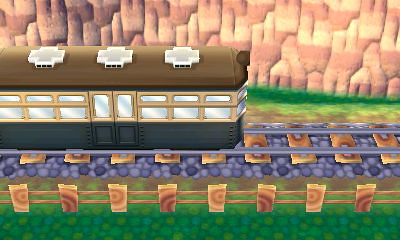
Dressed in a green cap, as Link, I strode into the Lost Woods, certain that I would find my way through. I didn’t know which way to go or how to solve the puzzles there. Eventually I had to ask friends how to solve it, so that I’d be able to progress. I couldn’t work out something that, in retrospect, seems incredibly simple. Follow the music and you’ll find friends. It seemed impossible at the time.
Animal Crossing: New Leaf is similarly, strangely impossible. I haven’t played the other games in the series, and I picked this one up with some trepidation. Not because it didn’t appeal, but because I was worried it might appeal too much. To be given a canvas and asked to create is a wonderful opportunity, and rare in gaming outside of modding communities. New Leaf, from what I saw of it before I bit the bullet and bought it, was not an unfiltered sandbox but a carefully constructed playground in which you could decide to play with the toys you preferred. You can catch bugs and fish, harvest and rearrange your fruit trees and your flowers. You can add buildings, make friends with digital townsfolk, create your own clothing, furnish your house. It is not a world-building game, nor a story-driven one, but a game about quiet creation and your own personal interests. Here is a town you can create from whole cloth, sewing yourself in where you wish. Here are a myriad potential towns: choose your own path. I am sucked in by such promises.
I was nervous before I bought it. It’s strange to say it out loud, as an adult, but I’ve watched other adults get sucked in, calling out for friends online so they can get the most out of their little town. I wanted to make something in New Leaf, a little world of my very own, but I didn’t want it to be cut off from the world. I understood instinctively something that @jennatar touches on tangentially, in passing, in her review: Animal Crossing, without real friends to ground it, becomes impossibly lonely. Impossibly sad. You are building something not to share but to sit untouched. New Leaf is meant to be played with other people: you open your town gates and other people come by, via the internet, to play together and see your little world. You go online to visit others. It’s a game about visiting, about creating something special and then sharing it. It has the nervous joy of showing someone your own artwork or reading your creative writing. It’s fragile and delicate.
My game has a problem. I can’t connect online. I can see other people’s gates are open. I can open mine. But only once has that connection functioned as it’s meant to. Someone came in and gave me a bounty: nine cherries, which I used to plant a new orchard. I wanted to show it off, next time they came. It has never let me connect online again. I’ve built a museum exhibit and stocked the flea market full. I’ve built bridges and clocks, planted bananas and mangoes, persuaded all of my animal townsfolk to stick around. I’ve made black flowers and caught rare bugs and learned to dance, and each of those moments was quietly exciting, in its own way. But without another human touch in this little computerised world, it’s meaningless. It’s a lonely town, and I’m a mayor without a purpose.
New Leaf is a beautiful game, and it’s wonderful to play online. I’m certain of this, because I’ve seen on Twitter the glee other people express when they find something new or share something entertaining. It’s a game full of delights and tiny surprises and astonishing, unfathomable attention to detail. But without other people, it becomes a grind: a slow, limited playground where your creations are nothing but fodder for animated creatures to use to fake a relationship. You sink time and energy into creative processes, coaxing life from pixels, then get back nothing in return. Sending letters and bushels of fruit to collections of automated responses is not enough. New Leaf makes you yearn for human touches: by design it asks you not just to create for yourself, but to create for an audience. When it fulfils that need, it is vastly successful, I’m certain. When tech problems mean that need is unfulfilled, it is nothing but cruel.